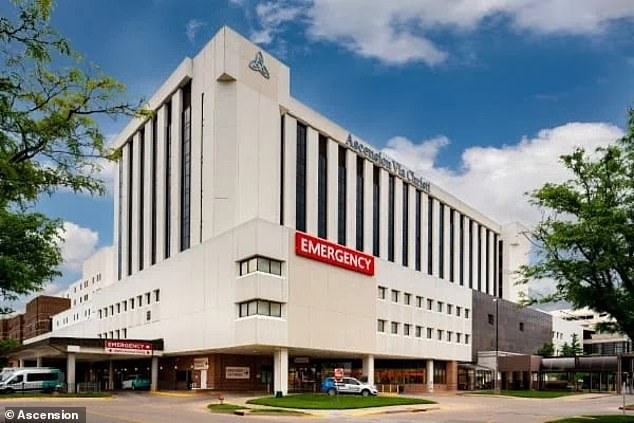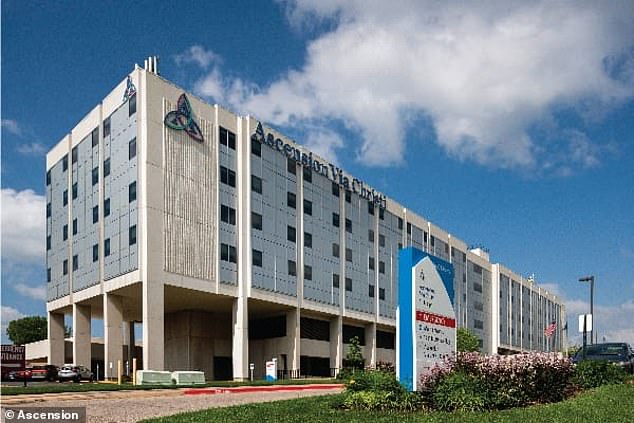Patients in Ascension’s hospital network were given lethal doses of narcotics after a disastrous cyberattack
A cyberattack on a major U.S. hospital system led to a deadly drug mix-up, including patients being accidentally administered narcotics, leading to an intensive care unit admission for life-threatening breathing difficulties.
In another case, a female patient went into cardiac arrest and died after data mishaps delayed test results determine her life-saving treatment.
Elsewhere, a nurse who worked for the Kansas division of the major medical group recalled a “near miss” in which he almost administered a fatal dose of narcotics to a baby – because of fake paperwork.
Officials at Ascension, a Catholic health care system with more than 140 facilities across the country, said these patients are just some of those suffering the lingering effects of a cyberattack last month.
The healthcare giant ‘detected unusual activity’ in its networks, leaving doctors and nurses locked out of digital systems and unable to access vital details about patient care.
ICU nurse Melissa LaRue at Ascension Saint Agnes Hospital in Baltimore (above) said she almost administered a dangerously wrong dose of a drug: a patient’s blood pressure medication

An ICU nurse who worked at Ascension Via Christi St. Francis in Kansas (above) said she almost gave the wrong medication to a critically ill patient because she couldn’t scan it as she had done in the past with electronic records
Despite Ascension claiming on June 14 that access to its network had been “restored,” more than a dozen employees have revealed that astonishing errors are still happening at hospital sites – from medication mix-ups to lost test results.
Employees say their hospitals are relying on shocking solutions to bypass the computers, including using handwritten, sticky notes to keep track of dozens of seriously ill patients.
Justin Neisser, a travel nurse who worked at Ascension Hospital at the time, told CBS4 in May: “I just want to warn patients coming to any of the Ascension facilities that there will be delays in care. There is a chance of errors and damage.
An emergency room doctor at an Ascension hospital in Michigan, who remained anonymous for fear of retaliation, told Kaiser Health News, a patient was given a dangerous narcotic intended for someone else due to confusing paperwork.
After being given the wrong drug, the patient’s breathing slowed dangerously and they had to be admitted to the intensive care unit and put on a ventilator.
The doctor said, “We intubated him and sent him to the ICU because he was given the wrong medication.”
Another responder, a nurse from Michigan who spoke on condition of anonymity, told Kaiser that a woman with low blood sugar and confusion went into cardiac arrest and died after hospital staff said they waited four hours for lab results they needed to continue her care . .
But they never received the results.

Marvin Ruckle, an Ascension nurse at Ascension Via Christi St Joseph in Kansas (above), told Kaiser Health News that he almost gave a baby “the wrong dose of narcotics” because of confusing paperwork
The nurse said, “If I got crushing chest pains while at work and thought I was in a bad pain, I would grab someone to drive me down the street to another hospital.”
Marvin Ruckle, a nurse at Ascension Via Christi St Joseph in Kansas, told Kaiser Health News that he almost gave a baby “the wrong dose of narcotics” because of confusing paperwork.
The nurse has worked in the neonatal intensive care unit for 20 years but said it was “difficult to decipher what the correct dose” of the child’s medication was on the baby chart.
Mr Ruckle said he had “never seen that happen when we were on the computer system” before the ransomware attack. She added that she had no training for cyber attacks.
Another ICU nurse who worked at Ascension Via Christi St. Francis in Kansas said she almost gave the wrong medication to a critically ill patient because she couldn’t scan it as she had done in the past with electronic records.
Lisa Watson told Kaiser, “My patient probably would have died if I hadn’t contracted it.”
And although Ms Watson had used paper charts for most of her career before electronic records were implemented, she said the system installed after the cyber attack was “by no means the same”.
She added, “When we mapped out the paper cards, we had systems in place to get those orders out to other departments in a timely manner, and they’re all gone.”
Across the country in Maryland, ICU nurse Melissa LaRue of Ascension Saint Agnes Hospital in Baltimore said she, too, almost administered the wrong dose of a drug: a patient’s blood pressure medication.
She said: ‘Luckily it was checked and fixed three times before that could happen. But I think there is a potential for harm when you have so much information and paperwork to go through.”
While Ascension may be one of the most recent, it is far from the only institution to suffer from cyber attacks. The FBI released its Internet Crime Report earlier this month, which found that nearly 1,200 organizations were affected by ransomware in 2023, including 250 reports from medical groups — most of the 16 industries covered in the report.
However, experts have warned that attacks on hospitals not only steal a patient’s information but also pose a serious threat to public safety. Other recent cyberattacks have left Americans unable to obtain life-saving medications, and in one case a nine-month-old baby lost her life.
Cybersecurity expert Steven McKeon previously told DailyMail.com that rickety infrastructures and outdated security systems have made it too easy for hackers to infect networks with ransomware, warning that the situation will only get worse.
DailyMail.com contacted Ascension for comment and a spokesperson referred this website to the hospital’s rack released last week.
However, Sean Fitzpatrick, Ascension’s vice president of external communications, told Kaiser via email: “As we have made clear during this cyberattack, which has impacted our system and our dedicated clinical providers, caring for our patients is our highest priority. We are confident that our providers in our hospitals and facilities will continue to provide high-quality medical care.”
